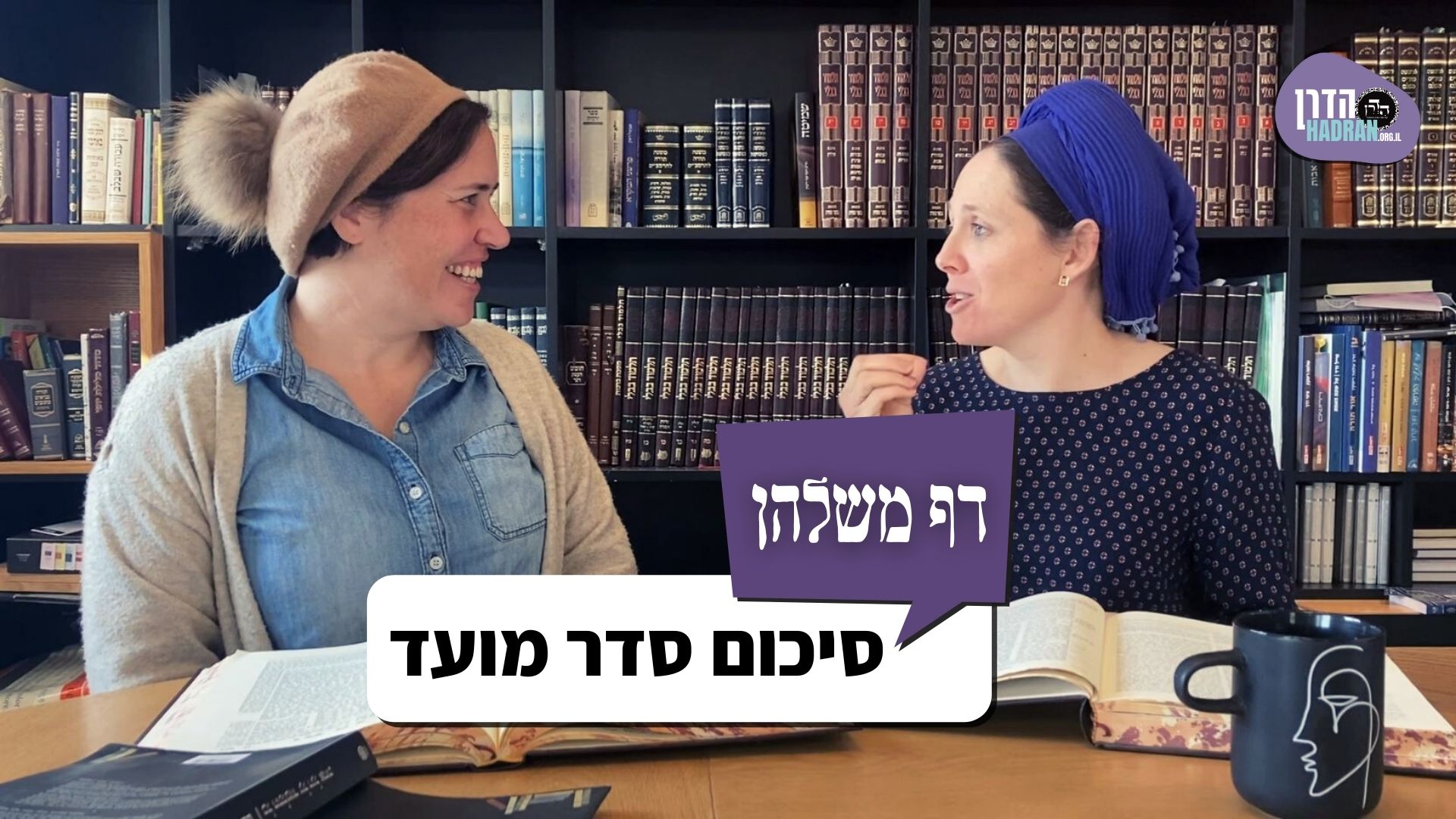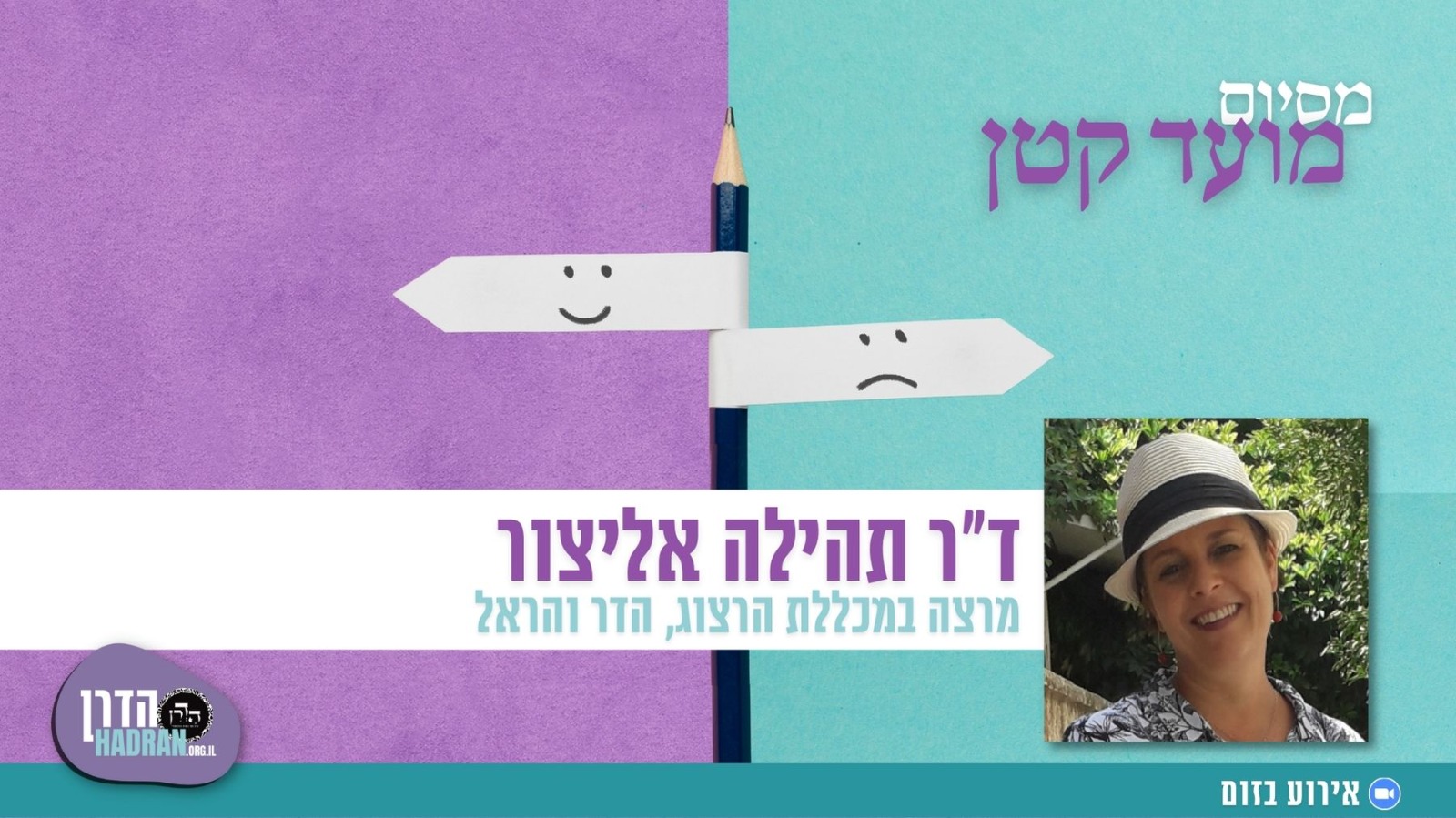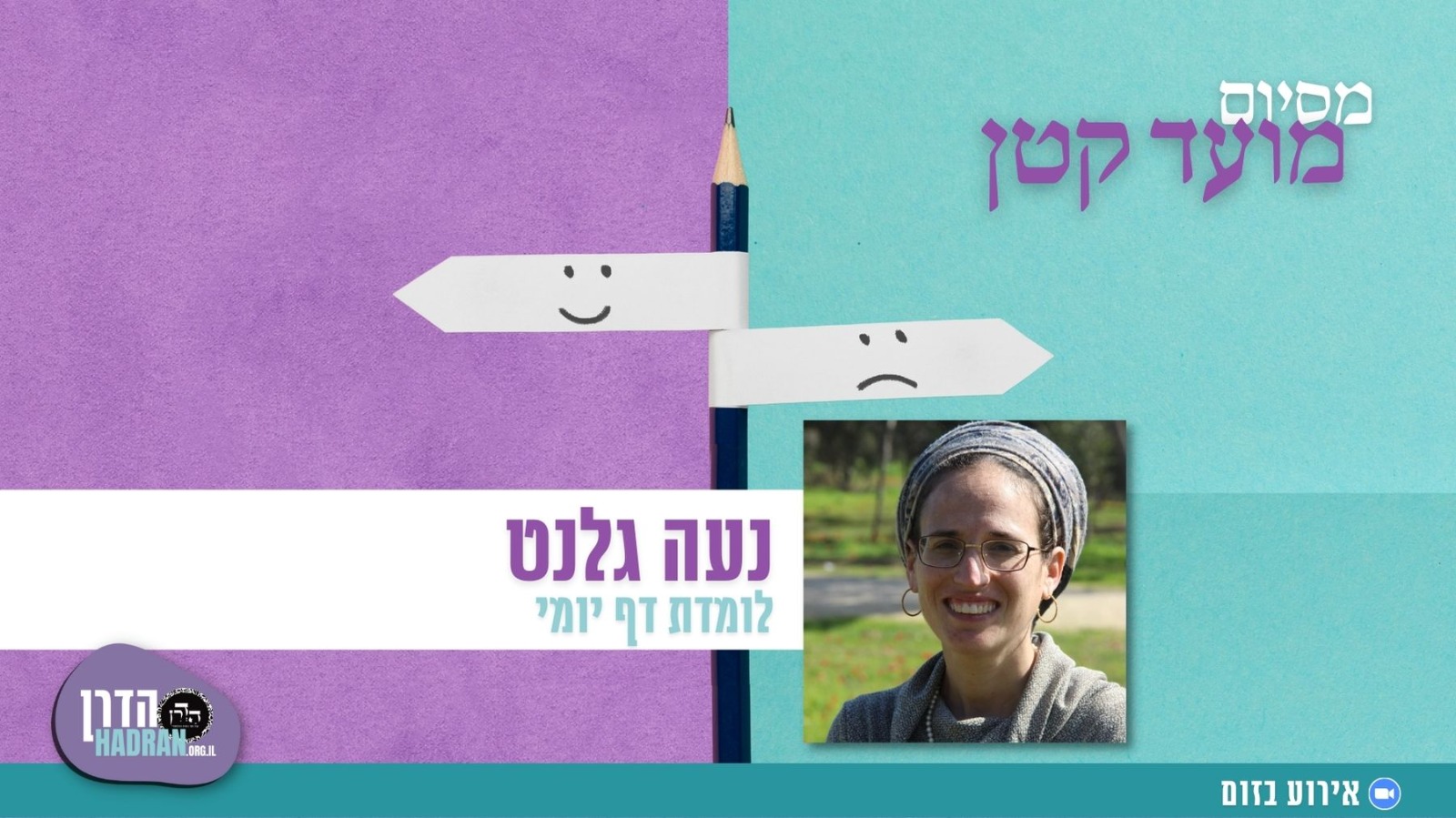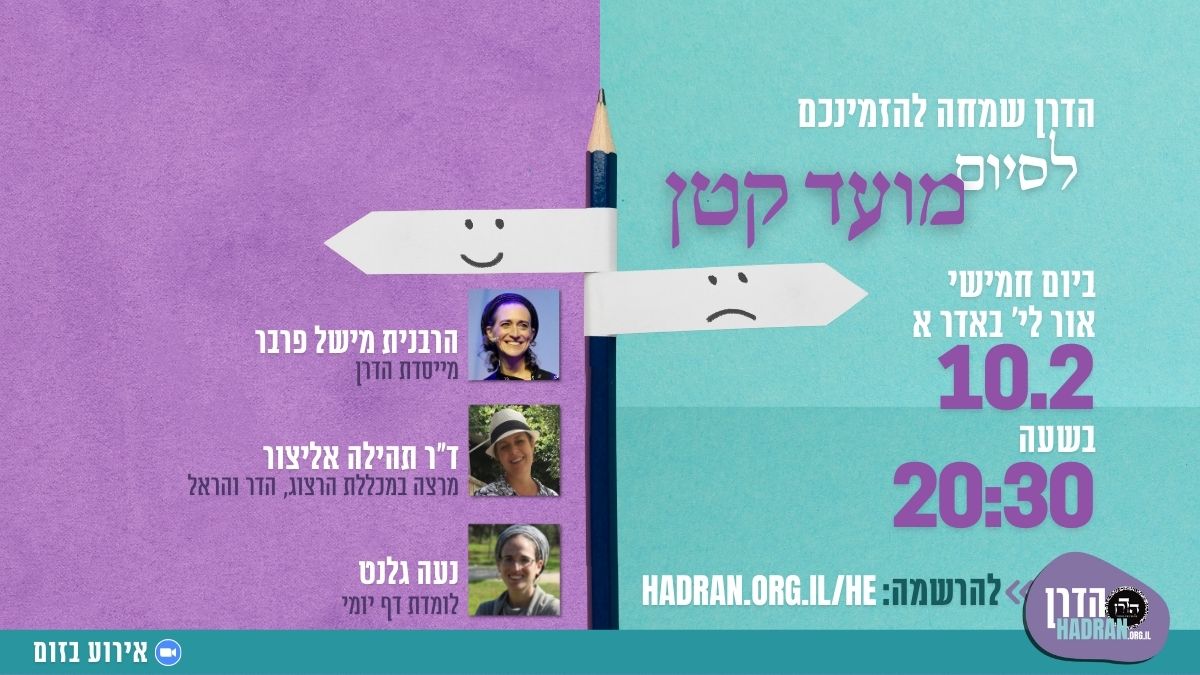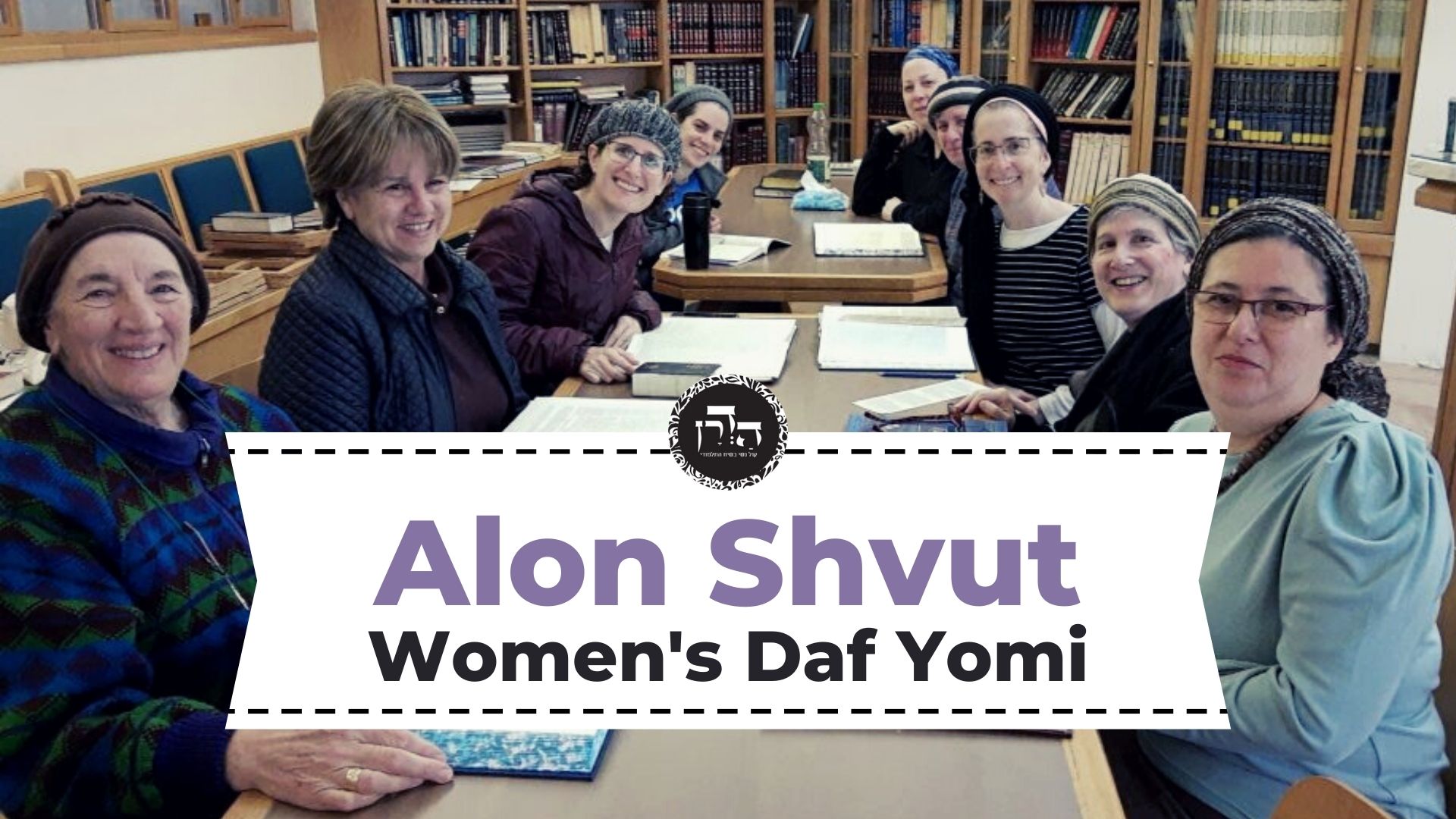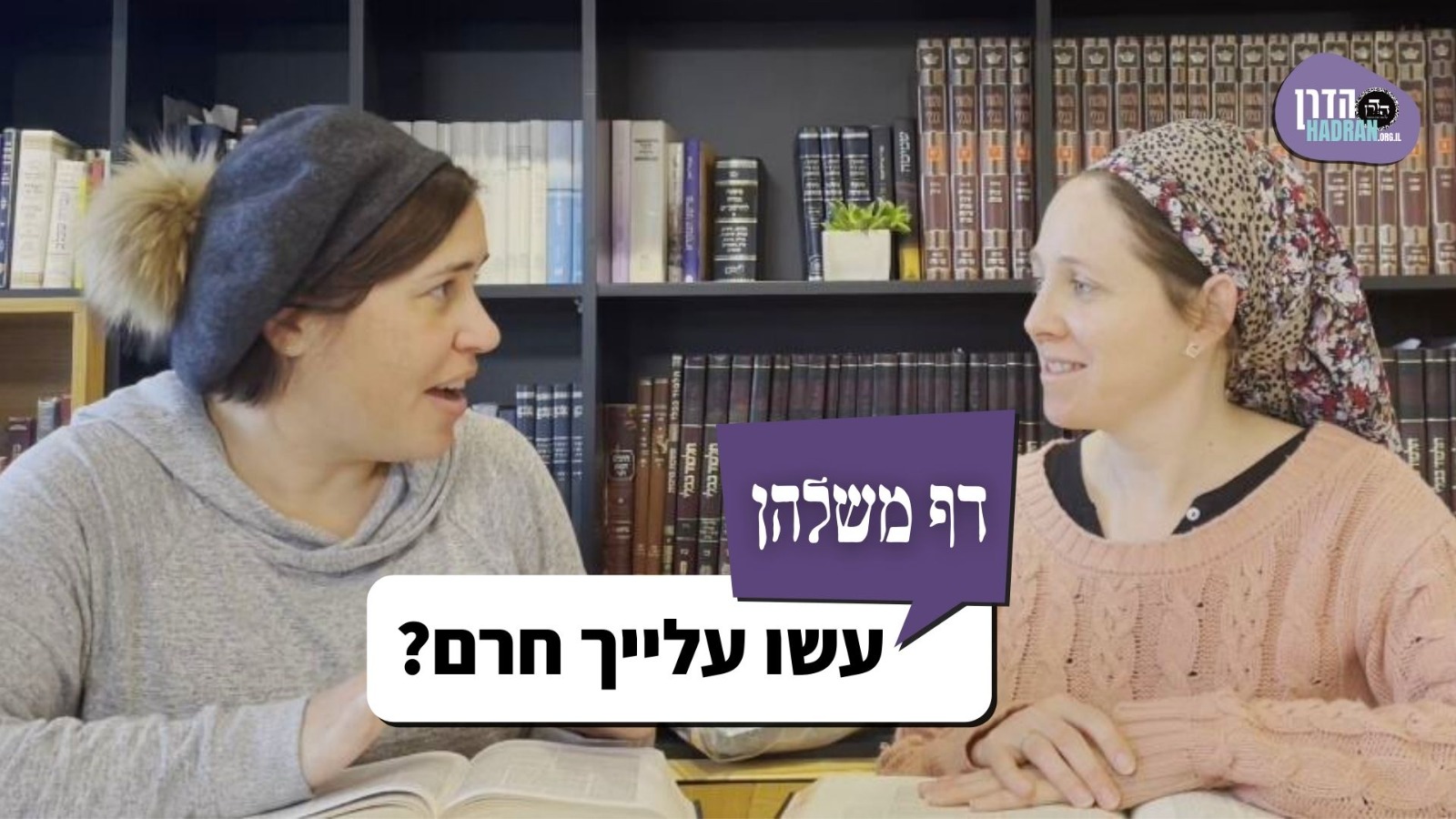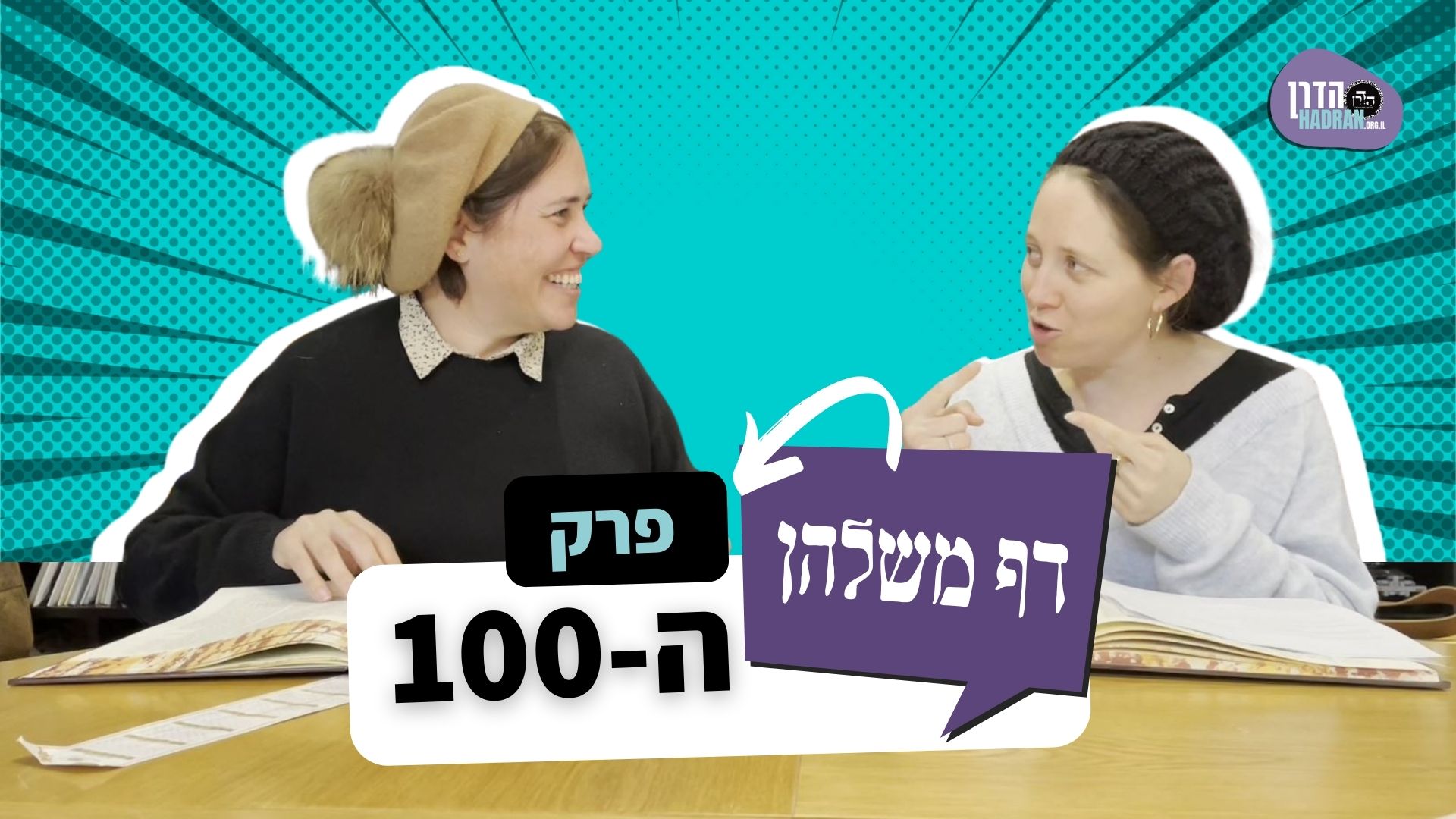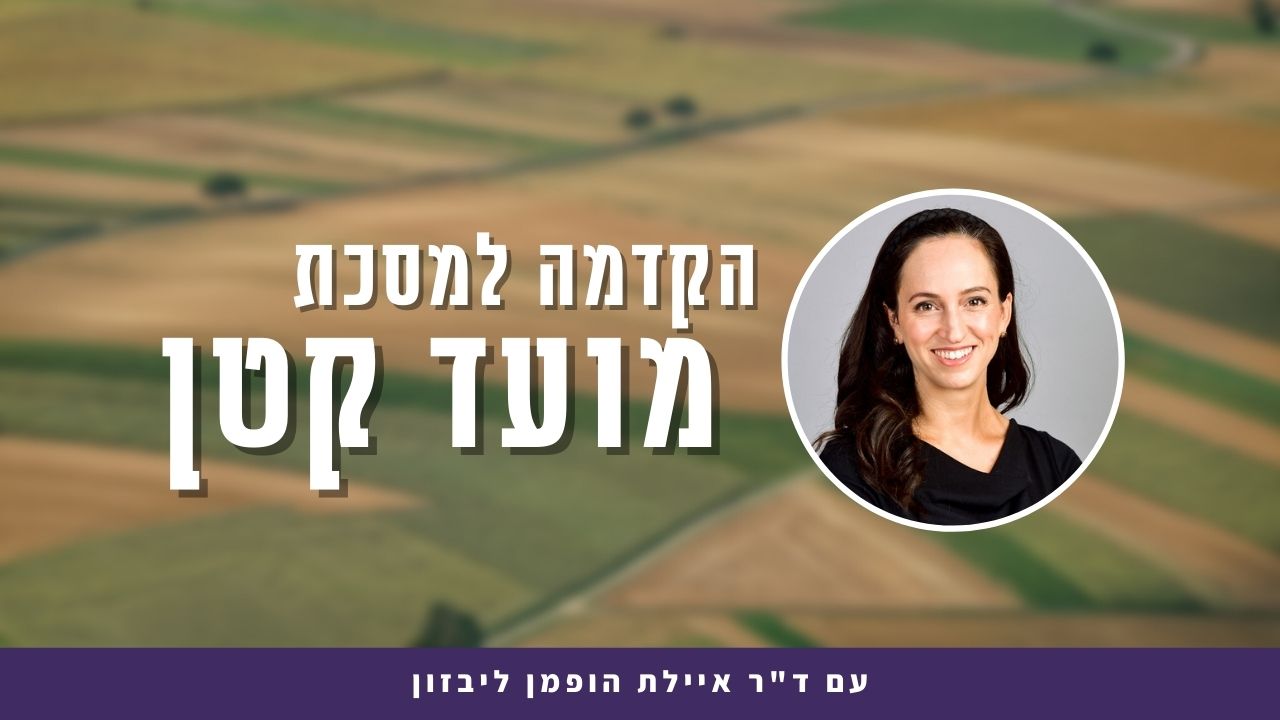רוצה להקדיש שיעור?
כלים
העמקה
רוצה להבין מה באמת קורה מתחת לפני השטח של הסוגיה?
שיעורים, פודקאסטים והרחבות של מיטב המורות שלנו יפתחו לך עוד זוויות וכיווני חשיבה.
חדשה בלימוד הגמרא?
זה הדף הראשון שלך? איזו התרגשות עצומה! יש לנו בדיוק את התכנים והכלים שיעזרו לך לעשות את הצעדים הראשונים ללמידה בקצב וברמה שלך, כך תוכלי להרגיש בנוח גם בתוך הסוגיות המורכבות ומאתגרות.
פסיפס הלומדות שלנו
גלי את קהילת הלומדות שלנו, מגוון נשים, רקעים וסיפורים. כולן חלק מתנועה ומסע מרגש ועוצמתי.
מועד קטן יג
צָרַם אֹזֶן בְּכוֹר קָנְסוּ בְּנוֹ אַחֲרָיו — מִשּׁוּם דְּאִיסּוּרָא דְּאוֹרָיְיתָא,
in the case of one who slit the ear of a firstborn animal, the Sages penalized his son after him, that is because the prohibition is by Torah law. A firstborn animal is disqualified from sacrifice if it becomes blemished, rendering it permitted to be eaten as non-sacred meat. It is prohibited to deliberately engender a blemish in a firstborn animal, and one who does so is prohibited from eating the meat.
וְאִם תִּמְצֵי לוֹמַר מָכַר עַבְדּוֹ לְגוֹי וָמֵת קָנְסוּ בְּנוֹ אַחֲרָיו — מִשּׁוּם דְּכֹל יוֹמָא מַפְקַע לֵיהּ מִמִּצְוֹת,
And if you might say that in the case of one who sold his slave to a gentile and then died the Sages penalized his son after him, that is because every day the slave is in the gentile’s possession precludes him from performing mitzvot. A Canaanite slave is obligated in the same mitzvot as a Jewish woman. If he is illicitly sold to a gentile and escapes, requiring the seller to compensate the gentile, the seller may not then re-enslave the slave, who is regarded as emancipated. The Sages extended this penalty to the owner’s heirs as well.
הָכָא מַאי: גַּבְרָא קָנֵיס רַבָּנַן — וְהָא לֵיתֵיהּ, אוֹ דִלְמָא: מָמוֹנָא קָנֵיס רַבָּנַן — וְהָא אִיתֵיהּ!
What, then, is the halakha here, where one planned from the outset to perform his work on the intermediate days of a Festival and then after performing the work he died? Should one say that the Sages penalized the man himself and he is no longer alive, or perhaps the Sages imposed a penalty on the money, such that no benefit may be derived from it, and it still exists in the hands of his heirs?
אֲמַר לֵיהּ, תְּנֵיתוּהָ: שָׂדֶה שֶׁנִּתְקַוְּוצָה בַּשְּׁבִיעִית — תִּזָּרַע לְמוֹצָאֵי שְׁבִיעִית, נִטַּיְּיבָה אוֹ נִדַּיְּירָה — לֹא תִּזָּרַע לְמוֹצָאֵי שְׁבִיעִית. וְאָמַר רַבִּי יוֹסֵי בַּר חֲנִינָא: נָקְטִינַן, הֱטִיבָהּ וָמֵת — בְּנוֹ זוֹרְעָהּ, אַלְמָא: לְדִידֵיהּ קְנַסוּ רַבָּנַן, לִבְרֵיהּ לָא קְנַסוּ רַבָּנַן. הָכָא נָמֵי: לְדִידֵיהּ קְנַסוּ רַבָּנַן, לִבְרֵיהּ לָא קְנַסוּ רַבָּנַן.
Rabbi Zeira said to Rabbi Yirmeya: You already learned the answer to your question in a mishna (Shevi’it 4:2): A field whose thorns were removed during the Sabbatical Year may be sown in the eighth year, as removing thorns is not full-fledged labor that renders the field prohibited; but if it had been improved with fertilizer, or if it had been enclosed so that animals therein would fertilize it with their manure, it may not be sown in the eighth year. The Sages imposed a penalty that one not benefit from prohibited labor. And Rabbi Yosei bar Ḥanina said: We have a tradition that if one improved his field in a prohibited manner and then died, his son may sow it. Apparently, the Sages penalized only him, the one who acted wrongly, but the Sages did not penalize his son. Here, too, with regard to work performed on the intermediate days of a Festival, the Sages penalized him, but the Sages did not penalize his son.
אָמַר אַבָּיֵי: נָקְטִינַן: טִימֵּא טַהֲרוֹתָיו וָמֵת — לֹא קָנְסוּ בְּנוֹ אַחֲרָיו. מַאי טַעְמָא — הֶיזֵּק שֶׁאֵינוֹ נִיכָּר לָא שְׁמֵיהּ הֶיזֵּק. לְדִידֵיהּ קְנַסוּ רַבָּנַן, לִבְרֵיהּ לָא קְנַסוּ רַבָּנַן.
Abaye said: We have a tradition that if one rendered impure another’s ritually pure items and died before paying, the Sages did not penalize his son after him and require him to pay for the damage. What is the reason for this? It is that damage that is not evident, i.e., that does not involve any physical change visible to the eye, is not considered damage by Torah law; nevertheless, the injured party suffers a loss, and the Sages penalized only him, but the Sages did not penalize his son.
מַתְנִי׳ אֵין לוֹקְחִין בָּתִּים עֲבָדִים וּבְהֵמָה אֶלָּא לְצוֹרֶךְ הַמּוֹעֵד, אוֹ לְצוֹרֶךְ הַמּוֹכֵר שֶׁאֵין לוֹ מַה יֹּאכַל.
MISHNA: One may not purchase houses, slaves, and cattle on the intermediate days of a Festival unless it is for the sake of the Festival, or to provide for the needs of the seller who does not have anything to eat.
גְּמָ׳ בְּעָא מִינֵּיהּ רָבָא מֵרַב נַחְמָן: שְׂכַר פְּעוּלָּה שֶׁאֵין לוֹ מַה יֹּאכַל, מַהוּ? אֲמַר לֵיהּ, תְּנֵינָא: אוֹ לְצוֹרֶךְ הַמּוֹכֵר שֶׁאֵין לוֹ מַה יֹּאכַל. לְאֵתוֹיֵי מַאי? לָאו לְאֵתוֹיֵי שְׂכַר פְּעוּלָּה! אֲמַר לֵיהּ: לָא, פָּרוֹשֵׁי קָא מְפָרֵשׁ.
GEMARA: Rava asked Rav Naḥman: What is the halakha with regard to wages for a worker who does not have anything to eat? Is it permitted to provide a poor worker with work on the intermediate days of the Festival? Rav Naḥman said to him: We learned this in the mishna: Or to provide for the needs of the seller, if he has nothing to eat. What is added by mentioning the condition that he has nothing to eat? Does it not add the case of wages and not only the case of one selling items he owns? Rava said to him: No, it is merely explaining what is meant by the needs of the seller.
אֵיתִיבֵיהּ אַבָּיֵי: אֵין כּוֹתְבִין שְׁטָרֵי חוֹב בַּמּוֹעֵד, וְאִם אֵינוֹ מַאֲמִינוֹ, אוֹ שֶׁאֵין לוֹ מַה יֹּאכַל — הֲרֵי זֶה יִכְתּוֹב. שֶׁאֵין לוֹ מַה יֹּאכַל — לְאֵתוֹיֵי מַאי? לָאו לְאֵתוֹיֵי שְׂכַר פְּעוּלָּה! שְׁמַע מִינַּהּ.
Abaye raised an objection from a mishna (18b): Promissory notes may not be written on the intermediate days of a Festival, but if the lender does not trust the borrower and is concerned that without such a note he will be unable to collect, or if he has nothing to eat, he may write a promissory note. The Gemara elaborates: What is added here by the words: If he has nothing to eat? Are they not meant to add that a promissory note may be written for the sake of the wages of the scribe who draws up the document? Conclude from it that it is permitted to hire a worker who is in need of a livelihood even for work that would otherwise be prohibited on the intermediate days of a Festival.
מוֹתֵיב רַב שֵׁשֶׁת: וַחֲכָמִים אוֹמְרִים, שָׁלֹשׁ אוּמָּנִיּוֹת עוֹשִׂין מְלָאכָה בְּעַרְבֵי פְסָחִים עַד חֲצוֹת: הַחַיָּיטִין וְהַסַּפָּרִין וְהַכּוֹבְסִין. הַחַיָּיטִין — שֶׁכֵּן הֶדְיוֹט תּוֹפֵר כְּדַרְכּוֹ בְּחוּלּוֹ שֶׁל מוֹעֵד, הַסַּפָּרִין וְהַכּוֹבְסִין — שֶׁכֵּן הַבָּאִין מִמְּדִינַת הַיָּם וְהַיּוֹצֵא מִבֵּית הָאֲסוּרִין מוּתָּרִין לְסַפֵּר וּלְכַבֵּס בְּחוּלּוֹ שֶׁל מוֹעֵד.
Rav Sheshet raised an objection from a mishna (Pesaḥim 55a) that addresses the prohibition against performing labor on the eve of Passover: And the Rabbis say: The practitioners of only three crafts are permitted to perform labor until midday on Passover eve, and they are the tailors, the barbers, and the launderers, whose work is needed for the Festival. The baraita elaborates: The tailors may perform labor on Passover eve, as a layperson is permitted to sew in his usual manner during the intermediate days of the Festival. Since similar labor is permitted during the Festival, one may be lenient on Passover eve as well. The barbers and the launderers are permitted to work, as those who arrive from overseas or one who leaves prison are permitted to cut their hair and wash their clothes on the intermediate days of the Festival because they had no opportunity to do so prior to the Festival.
וְאִי סָלְקָא דַעְתָּךְ שְׂכַר פְּעוּלָּה שֶׁאֵין לוֹ מַה יֹּאכַל שְׁרֵי — כׇּל מְלָאכוֹת נָמֵי לִישְׁתְּרוֹ, דְּהָא אִיכָּא שְׂכַר פְּעוּלָּה שֶׁאֵין לוֹ מַה יֹּאכַל!
And if it enters your mind that paying wages to a worker who does not have anything to eat is permitted on the intermediate days of the Festival, then all other types of labor should also be permitted on the eve of Passover, as there is something similar permitted on the intermediate days of the Festival, namely, the wages paid to a worker who does not have anything to eat. Tailors are permitted to work on the eve of Passover because similar work is permitted during the intermediate days of the Festival. The payment of wages to a worker who does not have anything to eat on the Festival must be prohibited, as otherwise similar work, i.e., any work involving the payment of wages, would be permitted on the eve of Passover, which is not the case.
מַתְקֵיף לַהּ רַב פָּפָּא: אֶלָּא מֵעַתָּה בִּנְיָן לִישְׁתְּרֵי, שֶׁכֵּן כּוֹתֶל הַגּוֹהֶה לִרְשׁוּת הָרַבִּים — סוֹתֵר וּבוֹנֶה כְּדַרְכּוֹ מִפְּנֵי הַסַּכָּנָה!
Rav Pappa strongly objects to this: If that is so, that one can derive halakhot in this manner, then building as well should be permitted on the eve of Passover, as a wall that tilts toward the public domain and is likely to fall may be demolished and rebuilt in the usual manner on the intermediate days of a Festival due to the danger posed to passersby. Since building under such circumstances is permitted on the intermediate days of a Festival, it should be permitted in general on the eve of Passover.
מַתְקֵיף לַהּ רָבִינָא: אֶלָּא מֵעַתָּה לַבְלָר לִישְׁתְּרֵי, שֶׁכֵּן כּוֹתְבִין קִידּוּשֵׁי נָשִׁים גִּיטִּין וְשׁוֹבָרִין!
Ravina also strongly objects to this: If that is so, a scribe [lavlar] who draws up documents should be permitted to do so on the eve of Passover, as one may write betrothal deeds, bills of divorce, and receipts on the intermediate days of a Festival.
אֶלָּא אָמַר רַב אָשֵׁי: מוֹעֵד אַאַרְבָּעָה עָשָׂר קָא רָמֵית? מוֹעֵד — מִשּׁוּם טִירְחָא הוּא, וּבִמְקוֹם פְּסֵידָא שָׁרוּ רַבָּנַן. אַרְבָּעָה עָשָׂר — מִשּׁוּם צוֹרֶךְ יוֹם טוֹב הוּא. מִידֵּי דְּצוֹרֶךְ יוֹם טוֹב שָׁרוּ רַבָּנַן, מִידֵּי דְּלָאו צוֹרֶךְ יוֹם טוֹב לָא שָׁרוּ רַבָּנַן.
Rather, Rav Ashi said that Rav Sheshet’s original objection has no basis: Are you raising a contradiction between the halakhot of the intermediate days of a Festival and the halakhot of the fourteenth day of Nisan, i.e., the eve of Passover? They are not comparable, as the prohibition against labor on each is for a different reason: Labor is prohibited on the intermediate days of a Festival because it involves excessive exertion, and in a situation of significant loss the Sages permitted it. In contrast, the prohibition against labor on the fourteenth of Nisan is due to the need to prepare for the Festival, and especially the Paschal lamb. Whatever is needed for the Festival, e.g., the work of tailors and barbers, the Sages permitted, but whatever is not needed for the Festival, the Sages did not permit.
מַתְנִי׳ אֵין מְפַנִּין מִבַּיִת לְבַיִת, אֲבָל מְפַנֶּה הוּא לַחֲצֵרוֹ. אֵין מְבִיאִין כֵּלִים מִבֵּית הָאוּמָּן, אִם חוֹשֵׁשׁ לָהֶם — מְפַנָּן לְחָצֵר אַחֶרֶת.
MISHNA: One may not move his possessions from house to house during the intermediate days of a Festival, but he may move them to his courtyard if that is necessary. One may not bring home utensils from the house of a craftsman after he has completed his work, but if one is concerned about them that if he leaves them in the craftsman’s house they are likely to be stolen, he may move them to another courtyard.
גְּמָ׳ וְהָאָמְרַתְּ רֵישָׁא אֵין מְפַנִּין כְּלָל? אָמַר אַבָּיֵי: סֵיפָא אֲתָאן לְבַיִת שֶׁבֶּחָצֵר.
GEMARA: The Gemara asks: But didn’t you say in the first clause of the mishna that one may not move one’s possessions at all, even from one house to another? How is it that the mishna then permits moving objects from one courtyard to another in the second clause? Abaye said in explanation: In the latter clause we come to the case of moving objects from the house in his courtyard to that same courtyard.
וְאֵין מְבִיאִין כֵּלִים מִבֵּית הָאוּמָּן. אָמַר רַב פָּפָּא: בָּדֵיק לַן רָבָא, תְּנַן: אֵין מְבִיאִין כֵּלִים מִבֵּית הָאוּמָּן, וּרְמִינְהוּ: מוֹלִיכִין וּמְבִיאִין כֵּלִים מִבֵּית הָאוּמָּן, וְאַף עַל פִּי שֶׁאֵינָן לְצוֹרֶךְ הַמּוֹעֵד!
The mishna states: And one may not bring home utensils from the house of a craftsman. Rav Pappa said: Rava tested us with the following question: We learned in the mishna that one may not bring home utensils from the house of a craftsman. And this raises a contradiction to another mishna (Pesaḥim 55b): One may take utensils to and bring them from the house of a craftsman, even if they are not needed for the sake of the Festival.
וְשַׁנֵּינַן לֵיהּ: כָּאן בְּאַרְבָּעָה עָשָׂר, כָּאן בְּחוּלּוֹ שֶׁל מוֹעֵד. אִיבָּעֵית אֵימָא: הָא וְהָא בְּחוּלּוֹ שֶׁל מוֹעֵד. כָּאן בְּמַאֲמִינוֹ, כָּאן בְּשֶׁאֵינוֹ מַאֲמִינוֹ.
And we answered him: Here, the mishna that permits the practice is referring to the fourteenth of Nisan, the eve of Passover, and here, the mishna that prohibits it, is referring to the intermediate days of a Festival. And if you wish, say another explanation: Both this and that refer to the intermediate days of a Festival, but here, the mishna that prohibits the practice is referring to a case where he trusts the craftsman and is not concerned about his utensils being lost or stolen, whereas here, the mishna that permits taking utensils to and from the craftsman is referring to a case where he does not trust the craftsman.
וְהָתַנְיָא: מְבִיאִין כֵּלִים מִבֵּית הָאוּמָּן, כְּגוֹן כַּד מִבֵּית הַכַּדָּר, וְכוֹס מִבֵּית הַזַּגָּג. אֲבָל לֹא צֶמֶר מִבֵּית הַצַּבָּע, וְלֹא כֵּלִים מִבֵּית הָאוּמָּן. וְאִם אֵין לוֹ מַה יֹּאכַל — נוֹתֵן לוֹ שְׂכָרוֹ וּמַנִּיחוֹ אֶצְלוֹ. וְאִם אֵינוֹ מַאֲמִינוֹ — מַנִּיחוֹ בְּבַיִת הַסָּמוּךְ לוֹ. וְאִם חוֹשֵׁשׁ לָהֶם שֶׁמָּא יִגָּנְבוּ — מְפַנָּן לְחָצֵר אַחֶרֶת, וְאִם אֵינוֹ מַאֲמִינוֹ — מְבִיאָן בְּצִנְעָה בְּתוֹךְ בֵּיתוֹ.
And so it is taught in a baraita: One may bring home utensils from the house of a craftsman; for example, a jug from the jug-maker’s house and a cup from the glass-blower’s house, as they will be used on the Festival itself. But he may not bring home wool from the dyer’s house or utensils from the craftsman’s house, as they are not needed on the Festival. But if the craftsman has nothing to eat, he may give him his wages during the Festival week and leave the utensil with him. And if he does not trust the craftsman to properly safeguard his utensil, he may take the utensil from the craftsman and leave it in a house near him. And if he is concerned about his utensils lest they be stolen, he may move them to another courtyard. And if he does not trust the owner of the other courtyard, he may bring them into his house discreetly.
תָּרֵצְתְּ מְבִיאִין, מוֹלִיכִין קַשְׁיָא, דְּקָתָנֵי: אֵין מְבִיאִין, וְכׇל שֶׁכֵּן שֶׁאֵין מוֹלִיכִין! אֶלָּא: מְחַוַּורְתָּא כִּדְשַׁנַּיִין מֵעִיקָּרָא.
The Gemara comments: You have adequately explained the contradiction between the mishnayot about whether one may bring home utensils from the house of a craftsman. The mishna that permits it can be understood as referring to a case where the craftsman is not to be trusted. But the mishna in Pesaḥim also states that one may take utensils to the house of a craftsman, and this is difficult, as the mishna above teaches: One may not bring home utensils from the house of a craftsman. And this indicates that all the more so, one may not take utensils from his house to that of the craftsman. Rather, it is clear as we answered initially that one mishna is referring to the eve of Passover and the other to the intermediate days of a Festival.
מַתְנִי׳ מְחַפִּין אֶת הַקְּצִיעוֹת בְּקַשׁ. רַבִּי יְהוּדָה אוֹמֵר: אַף מְעַבִּין. מוֹכְרֵי פֵירוֹת, כְּסוּת וְכֵלִים — מוֹכְרִים בְּצִנְעָה לְצוֹרֶךְ הַמּוֹעֵד. הַצַּיָּידִין וְהַדָּשׁוֹשׁוֹת וְהַגָּרוֹסוֹת — עוֹשִׂין בְּצִנְעָה לְצוֹרֶךְ הַמּוֹעֵד. רַבִּי יוֹסֵי אוֹמֵר: הֵם הֶחֱמִירוּ עַל עַצְמָן.
MISHNA: On the intermediate days of a Festival, figs that were spread out to dry may be covered with straw to protect them from rain and dew. Rabbi Yehuda says: One may even condense the figs. Those who sell produce, clothing, and utensils may sell them in private, for the sake of the Festival. Fishermen, and groats makers [dashoshot], and bean pounders, who pulverize the beans, may ply their trades in private for the sake of the Festival. Rabbi Yosei says: They were stringent with themselves to refrain from this work even with respect to what was needed for the Festival.
גְּמָ׳ פְּלִיגִי בַּהּ רַבִּי חִיָּיא בַּר אַבָּא וְרַבִּי אַסִּי, וְתַרְוַיְיהוּ מִשְּׁמֵיהּ דְּחִזְקִיָּה וְרַבִּי יוֹחָנָן. חַד אָמַר: ״מְחַפִּין״ אַקְלוֹשֵׁי, ״מְעַבִּין״ אַסְמוֹכֵי. וְחַד אָמַר: ״מְחַפִּין״ בֵּין אַקְלוֹשֵׁי בֵּין אַסְמוֹכֵי, ״מְעַבִּין״ — עוֹשֶׂה אוֹתוֹ כְּמִין כְּרִי. תַּנְיָא נָמֵי הָכִי: ״מְעַבִּין״ עוֹשֶׂה אוֹתוֹ כְּמִין כְּרִי, דִּבְרֵי רַבִּי יְהוּדָה.
GEMARA: Rabbi Ḥiyya bar Abba and Rabbi Asi disagree about the following issue, and both of them assert their opinions in the name of Ḥizkiyya and Rabbi Yoḥanan. One said: Cover the figs means to lightly cover them with straw, and condense means to spread straw over them densely. And the other one said: Cover means to spread straw over them whether lightly or densely, and condense means to amass the figs into a pile, making it as if it were a pile of grain. This is also taught in a baraita: One may condense, i.e., amass the figs into a pile, making it as if it were a pile of grain. This is the statement of Rabbi Yehuda.
מוֹכְרֵי פֵירוֹת כְּסוּת וְכֵלִים מוֹכְרִין בְּצִנְעָה וְכוּ׳. אִיבַּעְיָא לְהוּ: הֵן הֶחֱמִירוּ עַל עַצְמָן — דְּלָא הֲווֹ עָבְדִי כְּלָל, אוֹ דִלְמָא דַּהֲווֹ עָבְדִי בְּצִנְעָה?
§ The mishna states: On the intermediate days of a Festival, those who sell produce, clothing, and utensils may sell them in private, for the sake of the Festival. Fishermen, groats makers, and bean pounders may ply their trades in private for the sake of the Festival. Rabbi Yosei says that they were stringent with themselves. The Sages were asked: When it says that they were stringent with themselves, does it mean that that they did not work at all on the intermediate days of a Festival, or perhaps it means that they did their work in private, though it is permitted to do it publicly?
תָּא שְׁמַע: מוֹכְרֵי פֵירוֹת כְּסוּת וְכֵלִים — מוֹכְרִין בְּצִנְעָה לְצוֹרֶךְ הַמּוֹעֵד, רַבִּי יוֹסֵי אוֹמֵר: תַּגָּרֵי טְבֶרְיָא הֵן הֶחֱמִירוּ עַל עַצְמָן שֶׁלֹּא יְהוּ מוֹכְרִין כׇּל עִיקָּר. צָדֵי חַיּוֹת וְעוֹפוֹת וְדָגִים — צָדִין בְּצִנְעָה לְצוֹרֶךְ הַמּוֹעֵד, רַבִּי יוֹסֵי אוֹמֵר: צָדֵי עַכּוֹ הֵן הֶחֱמִירוּ עַל עַצְמָן שֶׁלֹּא יְהוּ צָדִין כׇּל עִיקָּר. דָּשׁוֹשֵׁי חִילְקָא טַרְגִּיס וְטִיסְנִי — דּוֹשְׁשִׁין בְּצִנְעָה לְצוֹרֶךְ הַמּוֹעֵד, רַבִּי יוֹסֵי אוֹמֵר: דָּשׁוֹשֵׁי צִיפּוֹרִי הֵן הֶחְמִירוּ עַל עַצְמָן שֶׁלֹּא יְהוּ דּוֹשְׁשִׁין כׇּל עִיקָּר.
The Gemara answers based on a baraita. Come and hear: Those who sell produce, clothing, and utensils may sell them in private, for the sake of the Festival. Rabbi Yosei says: The merchants of Tiberias were stringent with themselves not to sell at all, even in private. Hunters of animals, fowlers, and fishermen may hunt their quarry discreetly for the sake of the Festival. Rabbi Yosei says: The hunters of Akko were stringent with themselves not to hunt at all. Groats makers who crack grain into groats called ḥilka, targis, and tisanei, crack the grain in private for the sake of the Festival. Rabbi Yosei says: The groats makers of Tzippori were stringent with themselves not to crack grain at all. According to Rabbi Yosei, the stringencies involve refraining from work entirely.
אָמַר אַבָּיֵי: חִילְקָא — חֲדָא לְתַרְתֵּי, טַרְגִּיס — חֲדָא לִתְלָת, טִיסְנִי — חֲדָא לְאַרְבְּעָה. כִּי אֲתָא רַב דִּימִי, אָמַר: כּוּנָּתָא.
Abaye said: The term ḥilka means one kernel that is broken into two; the term targis means one kernel that is broken into three; and the term tisanei means one grain that is broken into four. When Rav Dimi came from Eretz Yisrael to Babylonia, he said: Ḥilka is referring to emmer wheat.
מֵיתִיבִי: חִילְקָא טַרְגִּיס וְטִיסְנִי טְמֵאִין בְּכׇל מָקוֹם. בִּשְׁלָמָא לְמַאן דְּאָמַר חֲדָא לְתַרְתֵּי לִתְלָת וּלְאַרְבְּעָה, מִשּׁוּם הָכִי טְמֵאִין בְּכׇל מָקוֹם — דְּאִתַּכְשׁוּר, אֶלָּא לְמַאן דְּאָמַר כּוּנָּתָא, אַמַּאי טְמֵאִין בְּכׇל מָקוֹם, הָא לָא אִיתַּכְשׁוּר?
The Gemara raises an objection from a baraita: Ḥilka, targis, and tisanei are susceptible to ritual impurity everywhere. Granted, according to the one who said that these are one grain broken into two, into three, and into four, due to that reason they are susceptible to impurity everywhere, as they have already become fit to contract ritual impurity by being rinsed with water in their processing. But according to the one who says that ḥilka is emmer wheat that has not necessarily been processed, why is it susceptible to ritual impurity everywhere, since it has not necessarily become fit to contract impurity by coming into contact with water?
כְּגוֹן דְּמִיקַּלְּפָן, דְּאִי לָאו דִּשְׁרָא לְהוּ בְּמַיָּא לָא הֲוָה מִיקַּלְפָא. וְאַמַּאי קָרֵי לֵיהּ ״חִילְקָא״ — דְּשָׁקֵל חִלְקַיְהוּ.
The Gemara answers: The baraita is referring to a case where, for example, the emmer wheat was husked, since if it had not been previously soaked in water, it would not have been possible to husk it. And why, according to this opinion, is it called ḥilka? It is called this because their husks [ḥelkayhu] were removed.
מֵיתִיבִי: הַנּוֹדֵר מִן הַדָּגָן — אָסוּר אַף בְּפוֹל הַמִּצְרִי יָבֵשׁ, וּמוּתָּר בְּלַח, וּמוּתָּר בְּאוֹרֶז בְּחִילְקָא וְטַרְגִּיס וְטִיסְנִי. בִּשְׁלָמָא לְמַאן דְּאָמַר חֲדָא לְתַרְתֵּי חֲדָא לִתְלָת וַחֲדָא לְאַרְבְּעָה — שַׁפִּיר, דִּנְפַקוּ לְהוּ מִתּוֹרַת דָּגָן, אֶלָּא לְמַאן דְּאָמַר כּוּנָּתָא, דָּגָן מְעַלְּיָא הוּא! קַשְׁיָא.
The Gemara raises an objection from a baraita: One who vows to prohibit himself from eating grain [dagan] is prohibited to partake of even dry Egyptian beans, and it is permitted for him to partake of fresh beans. And it is permitted for him to partake of rice, as well as of ḥilka, and targeis, and tisnei. Granted, according to the one who said that these are one grain broken into two, one grain broken into three, and one grain broken into four, it is fine, as when the wheat is crushed into these it leaves the category of grain. But according to the one who says that ḥilka is emmer wheat, it is still a proper grain. The Gemara concludes: Indeed, it is difficult.
רַב הוּנָא שְׁרָא לְהוּ לְהָנְהוּ כְּרוּפְיָיתָא לְמֵיזַל לְזַבּוֹנֵי כִּי אוֹרְחַיְיהוּ בְּשׁוּקָא. אֵיתִיבֵיהּ רַב כָּהֲנָא: חֲנוּת פְּתוּחָה לִסְטָיו — פּוֹתֵחַ וְנוֹעֵל כְּדַרְכּוֹ,
§ The Gemara relates that Rav Huna permitted the spice merchants [kerufayata] to go and sell their products in their usual manner in the marketplace on the intermediate days of a Festival. Rav Kahana raised an objection to Rav Huna’s ruling from a baraita: If a store opens into a row of pillars that runs along the street, the storekeeper may open and close it in his usual manner on the intermediate days of a Festival, since it is not in the public’s view.
פְּתוּחָה לִרְשׁוּת הָרַבִּים — פּוֹתֵחַ אַחַת וְנוֹעֵל אַחַת, וְעֶרֶב יוֹם טוֹב הָאַחֲרוֹן שֶׁל חַג מוֹצִיא וּמְעַטֵּר אֶת שׁוּקֵי הָעִיר בְּפֵירוֹת בִּשְׁבִיל כְּבוֹד יוֹם טוֹב הָאַחֲרוֹן. מִפְּנֵי כְּבוֹד יוֹם טוֹב הָאַחֲרוֹן אִין, שֶׁלֹּא מִפְּנֵי כְּבוֹד יוֹם טוֹב לָא!
However, if it is open to the public domain, he may open only one door and must close the other. And on the eve of the last day of the festival of Sukkot, he may take out his wares from the store and adorn the markets of the city with fruit in honor of the last day of the Festival. The Gemara infers: For the honor of the last day of the Festival, yes, it is permitted for him to open the store in order to give people the opportunity to prepare for the holiday, but when not for the honor of the Festival, i.e., during the other intermediate days of the Festival, he is not permitted to do so. How, then, did Rav Huna permit those spice merchants to sell as usual on the intermediate days of the Festival?
לָא קַשְׁיָא: הָא בְּפֵירֵי, הָא בְּתַבְלִין.
The Gemara answers: This is not difficult: This baraita that prohibits selling in the usual manner is referring to the sale of fruit, which is usually bought in large quantities and could have been purchased before the Festival; people might therefore suspect the buyer of purchasing it for use after the Festival. In contrast, this lenient ruling of Rav Huna is referring to the sale of spices, which is permitted because people buy them only in small quantities for the sake of the Festival.
הֲדַרַן עֲלָךְ מִי שֶׁהָפַךְ
וְאֵלּוּ מְגַלְּחִין בַּמּוֹעֵד: הַבָּא מִמְּדִינַת הַיָּם וּמִבֵּית הַשִּׁבְיָה, וְהַיּוֹצֵא מִבֵּית הָאֲסוּרִין, וְהַמְנוּדֶּה שֶׁהִתִּירוּ לוֹ חֲכָמִים, וְכֵן מִי שֶׁנִּשְׁאַל לְחָכָם וְהוּתַּר, וְהַנָּזִיר וְהַמְּצוֹרָע מִטּוּמְאָתוֹ לְטׇהֳרָתוֹ.
MISHNA: And these may shave and cut their hair on the intermediate days of a Festival: One who comes from a country overseas; and one who is released from a house of captivity; and one who comes out of prison on the intermediate days of a Festival; and one who had been ostracized and therefore prohibited from cutting his hair, and the Sages released him from his decree of ostracism on the intermediate days of the Festival; and similarly, one who had vowed not to cut his hair and then requested of a Sage to dissolve his vow and was released from it on the intermediate days of the Festival; and the nazirite whose term of naziriteship ended on the intermediate days of a Festival; and the leper who needs to purify himself on the intermediate days and must shave his entire body in order to leave his state of ritual impurity and regain his ritual purity. Since these people were not able to cut their hair on the eve of the Festival, they are permitted to do so on the intermediate days of the Festival.
וְאֵלּוּ מְכַבְּסִין בַּמּוֹעֵד: הַבָּא מִמְּדִינַת הַיָּם וּמִבֵּית הַשִּׁבְיָה, וְהַיּוֹצֵא מִבֵּית הָאֲסוּרִין,
And these may launder their clothes on the intermediate days of a Festival: One who comes from a country overseas; and one who is released from a house of captivity; and one who comes out of prison on the intermediate days of a Festival;

